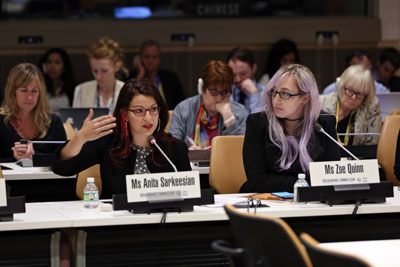An extraordinary United Nations report on “Cyberviolence Against Women and Girls” has been withdrawn pending revision by the U.N. Broadband Commission, the body that published it. This followed widespread criticism from across the political spectrum.
The report equated “cyber violence” and “online harassment” with physical violence. According to feminist critic Anita Sarkeesian, who attended the event, “online harassment” included comments like “you suck.” The report also called on national governments to force ISPs and search engines to filter their content. As we reported previously, this would have effectively censored the entire web.
The report was by all accounts incredibly poorly researched, with over 30 per cent of its citations links either broken or missing. Others linked to articles from the early 2000s which accused video game companies of promoting satanism, while another linked to the local hard drive of a researcher.
The report received criticism from across the political spectrum. Caitlyn Dewey at the Washington Post said the report was a “step too revolutionary,” while the notorious online abuser and progressive heroine Randi Harper also came out strongly against the report. Naturally, with web censorship at stake, we at Breitbart were also scathing in our analysis of the report. We were joined on the right by C.T Rex of BuzzPo and HotAir.
The Entertainment Software Association, the trade body representing the U.S video games industry, slammed the report as “uninformed, misguided, and unfortunate,” and highlighted its “hyperbolic, outlandish, and outdated notions of video games and gamers.”
Not everyone was unwelcoming of the report, however. Salon columnist Arthur Chu thought the report did not go far enough in its call for web censorship, and called for Section 203 of the Communications Decency Act, a key law protecting web freedom in the U.S, to be repealed. “Geek feminism” blog The Mary Sue praised it, although the writer admitted she had “only skimmed” the report.
Despite the isolated attempts to defend the report, its flaws became too apparent for even the U.N Broadband Commission to defend. Its withdrawal pending review is an acknowledgement that the launch was a failure. For the friends of web censorship, it will be remembered as a major embarrassment.
Follow Allum Bokhari @LibertarianBlue on Twitter.

COMMENTS
Please let us know if you're having issues with commenting.